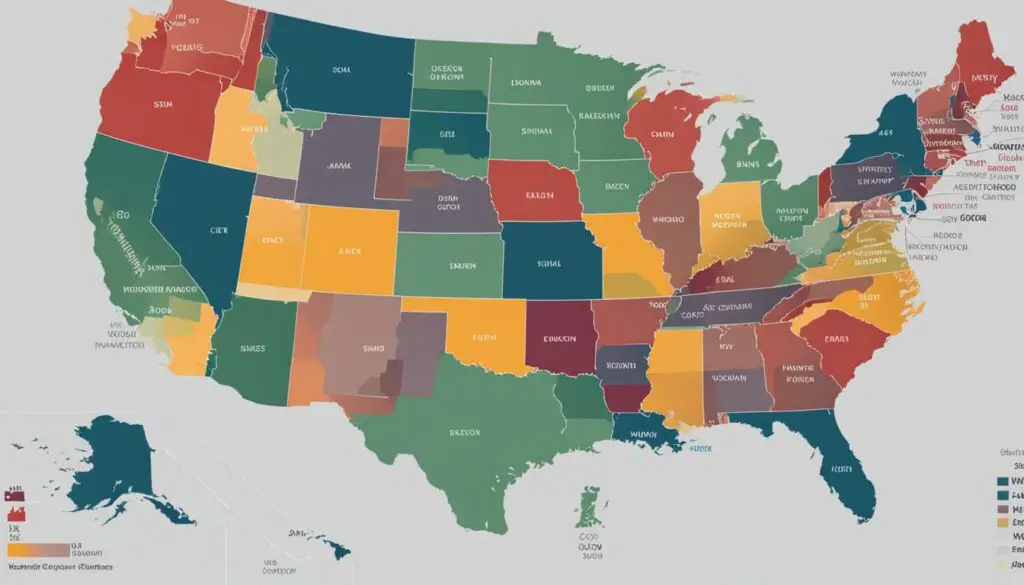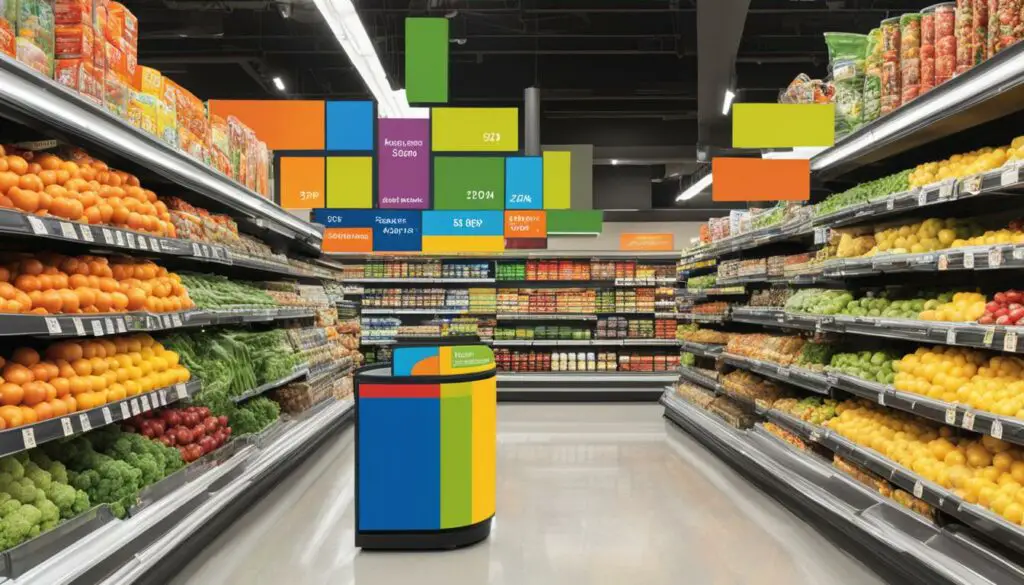Curious about how much grocery store workers make? If you’re considering a career in the grocery industry, it’s essential to understand the average salary of grocery store workers in the US. The salary can vary significantly depending on various factors such as the state you work in, your job title, and the type of store.
According to the latest data, there are some states that offer higher salaries for grocery workers. On the other hand, there are also states where the average salary is relatively lower. It’s important to consider these factors when contemplating a career in the grocery store industry.
Table of Contents
Key Takeaways:
- The salary of grocery store workers in the US varies depending on the state.
- High paying states for grocery workers include Washington, Utah, South Dakota, California, and Oregon.
- The average salary ranges from $38,226 in Washington to $24,010 in Maine.
- A variety of factors can affect grocery store worker salaries, including location, experience, and job position.
- Benefits such as healthcare, retirement plans, and career advancement opportunities may also be offered.
Highest Paying States for Grocery Store Workers

When it comes to grocery store worker salaries, the location plays a significant role. Some states offer higher wages compared to others, making them more attractive for those seeking employment in this field. Based on the latest data, the highest paying states for grocery store workers in the US include:
- Washington: With an average salary of $38,226, Washington takes the lead as the highest paying state for grocery store workers.
- Utah: In second place is Utah, where grocery store workers earn an average salary of $34,948.
- South Dakota: South Dakota comes in third place, with an average salary of $32,239 for grocery store workers.
- California: Offering competitive salaries, California ranks fourth with an average earnings of $36,227 for grocery store workers.
- Oregon: Oregon follows closely behind, with an average salary of $34,043 for grocery store workers.
These states not only provide higher salaries but also offer opportunities for growth and stability in the grocery store industry.
“Washington, Utah, South Dakota, California, and Oregon are the top states for the highest paying grocery store worker salaries.”
Lowest Paying States for Grocery Store Workers

While grocery store worker salaries can vary significantly depending on the state, there are certain states where wages tend to be lower compared to others. The lowest paying states for grocery store workers in terms of average salary include South Carolina, Wisconsin, and Iowa. Here is an overview of the average salaries in these states:
| State | Average Salary |
|---|---|
| South Carolina | $20,963 |
| Wisconsin | $26,461 |
| Iowa | $25,370 |
Please note that these figures represent the average salaries and individual wages may vary based on factors such as experience and job position.
Despite the lower salaries in these states, it’s important to remember that the cost of living and other factors may also differ, which can affect overall quality of life. Individuals considering a career in the grocery store industry in these states should weigh the salary against other factors such as benefits, work-life balance, and opportunities for growth within the company.
Evaluating the Regional Differences
Understanding the regional differences in grocery store worker salaries can provide valuable insights for both job seekers and employers. Factors such as local economies, cost of living, and competition among employers can contribute to the variations in wages. It’s crucial for individuals to assess the overall compensation package, including benefits and career growth opportunities, rather than solely focusing on salary figures.
Factors Affecting Grocery Store Worker Salaries

Salaries of grocery store workers can be influenced by various factors. These factors include:
- Location of the Store: Workers in high-cost-of-living areas often earn higher wages due to the increased expenses associated with residing in such locations.
- Experience and Skill Level: Similar to many other professions, experience and skill level can play a significant role in determining a grocery store worker’s salary. Typically, more experienced workers with developed skills are rewarded with higher compensation packages.
- Size and Type of the Store: The size and type of the store can also impact earnings. Larger grocery store chains often have the means to offer better compensation packages to their employees, including higher salaries and additional benefits.
To further illustrate the impact of these factors, consider the following:
“As a grocery store worker in a high-cost-of-living city like San Francisco, I benefit from higher wages compared to my peers experiencing a lower cost of living in smaller towns. Additionally, my extensive experience and the fact that I work for a well-known supermarket chain have contributed to a more competitive salary.”
Understanding these factors and their influence on salaries can help both current and aspiring grocery store workers navigate the industry with a clearer understanding of the compensation they can expect.
Regional Salary Differences for Grocery Store Workers

When it comes to the salaries of grocery store workers, there are notable regional differences across the United States. States like New York and Colorado offer higher average salaries for these workers compared to states like Florida and Arkansas. These disparities can be attributed to various factors that influence wage levels in different regions.
The cost of living plays a significant role in determining salary differences. In states with higher living expenses, such as New York, grocery store workers tend to earn higher wages to compensate for the higher costs they face. On the other hand, states with lower costs of living, like Arkansas, may have lower average salaries for grocery store workers.
Local economies also impact regional salary differences. Areas with thriving economies and higher levels of consumer spending tend to offer better compensation for grocery store workers. States like Colorado, with a strong economy and a higher standard of living, reflect this trend by providing higher average salaries for workers in the grocery industry.
Competition among employers in a particular region is another factor influencing regional salary differences. In areas with a higher concentration of grocery stores, employers may offer higher wages to attract and retain skilled workers. This competition can drive up salaries, benefiting grocery store workers in those regions.
It’s important to note that regional salary differences for grocery store workers are not limited to individual states. Within a state, there might also be variations in salaries based on factors like city or rural areas. Local economic conditions, population density, and market dynamics at the city-level can further influence wage levels for grocery store workers.
Understanding these regional salary differences is crucial for both workers and employers in the grocery store industry. For workers, it helps to determine potential job opportunities in different regions and plan their career paths accordingly. Employers, on the other hand, need to consider regional wage trends to ensure they are offering competitive compensation packages to attract and retain skilled employees.
Next, let’s explore how the salaries of grocery store workers can differ based on job titles within the industry.
Salary Comparison by Job Title in Grocery Stores

While analyzing the data on grocery store worker salaries, it’s important to consider the variation in earnings based on different job titles within grocery stores. The salaries can significantly differ depending on the position held. Let’s take a closer look at the salary comparison across various job titles:
1. Store Managers
Store managers play a crucial role in overseeing the overall operations of a grocery store. They are responsible for managing staff, ensuring customer satisfaction, and meeting business objectives. Due to the level of responsibility and leadership required for this position, store managers typically earn higher salaries compared to other roles.
2. Department Managers
Department managers are responsible for the efficient functioning and management of specific departments within the grocery store, such as produce, deli, or bakery. They supervise the department staff, handle inventory and ordering, and maintain quality standards. These specialized roles often come with higher salaries as they require extensive knowledge and expertise.
3. Specialized Roles
Grocery stores also have specialized roles that require specific skills or knowledge, such as butchers, bakers, or trained cheese mongers. These positions often offer higher salaries to compensate for the specialized training and expertise required.
4. Entry-level Positions
Entry-level positions, such as cashiers or stock clerks, generally have lower salaries compared to managerial or specialized roles. These positions are frequently filled by individuals who are gaining initial work experience or seeking part-time employment. While the salary may be lower, these roles often provide opportunities for growth and advancement within the grocery store industry.
It’s essential for job seekers to consider the salary range associated with different job titles in grocery stores. Making informed decisions about career paths and job preferences can lead to better earnings and job satisfaction.
For a comprehensive understanding of the salary ranges in grocery store job titles, refer to the table below:
| Job Title | Average Salary |
|---|---|
| Store Managers | $XX,XXX – $XX,XXX |
| Department Managers | $XX,XXX – $XX,XXX |
| Specialized Roles | $XX,XXX – $XX,XXX |
| Entry-Level Positions | $XX,XXX – $XX,XXX |
Keep in mind that these salary ranges are approximate and can vary based on factors such as geographic location, store size, and individual qualifications. Conducting further research and exploring job opportunities can provide more accurate salary expectations.
Salary Variation by Store Type
The salaries of grocery store workers can vary depending on the type of store they work in. Larger supermarkets and chain stores generally offer better compensation compared to smaller independent stores.
This variation in salary can be attributed to several factors. Firstly, larger stores benefit from economies of scale, allowing them to allocate more resources towards employee wages. Additionally, these stores typically have higher sales volumes, which can result in greater revenue and profitability, enabling them to offer higher salaries.
“Working for a large supermarket chain has its perks. Not only do I receive a competitive salary, but the company also provides opportunities for growth and advancement within the organization. It’s a great feeling to know that my hard work is recognized and rewarded.”
– Amy Johnson, Assistant Manager at a leading supermarket chain
Furthermore, larger chains often have standardized corporate salary structures in place, which ensure consistency in compensation across multiple locations. This can result in higher wages for grocery store workers in these establishments.
On the other hand, smaller independent stores may have more limited resources and lower sales volumes, which can impact their ability to offer higher salaries. However, it’s important to note that smaller stores may compensate for lower wages by providing a more close-knit working environment and fostering a strong sense of community among employees.
Overall, when considering employment in the grocery store industry, it’s essential for individuals to research and evaluate the salary variations associated with different store types, taking into account factors such as size, ownership, and corporate structure.
Salary Comparison by Store Type
| Store Type | Average Salary |
|---|---|
| Large Supermarket/Chain Store | Higher compensation |
| Smaller Independent Store | Lower compensation |
Job Market Outlook for Grocery Store Workers

The job market outlook for grocery store workers is promising, with stable employment prospects projected for the coming years. Despite potential slight variations influenced by local economic conditions and consumer trends, the demand for grocery store workers is expected to persist. These workers play a vital role in ensuring the public’s food needs are met, making them indispensable to the functioning of society.
The Essential Role of Grocery Store Workers
Grocery store workers are an essential component of the food supply chain, responsible for maintaining the smooth operation of grocery stores and ensuring that customers have access to the products they need. Their diverse range of responsibilities includes stocking shelves, assisting customers, operating cash registers, and maintaining cleanliness and safety protocols within the store.
Despite the rise of online shopping and delivery options, the physical presence of grocery stores remains crucial, as many customers still prefer to shop in person, especially for fresh produce and perishable items. This preference, coupled with the need for immediate access to groceries, guarantees a continued demand for grocery store workers.
The COVID-19 pandemic highlighted the vital importance of grocery store workers as frontline essential workers. They played a pivotal role in ensuring the uninterrupted availability of food and other necessary supplies during lockdowns and restrictions. As the pandemic subsides, the relevance and value of these workers have become even more apparent.
Stable Employment Opportunities
The stability of employment opportunities for grocery store workers is attributed to the consistent demand for their services. Grocery stores operate in both urban and rural areas, serving diverse communities and catering to a wide range of customer needs. The constant flow of customers and the necessity of maintaining stock levels requires a steady workforce, ensuring job security for grocery store workers.
Additionally, the frequent turnover in the industry creates job openings and opportunities for those seeking employment. As employees move on to different careers or pursue higher education, entry-level positions become available, enabling new individuals to enter the workforce as grocery store workers.
Continued Growth in the Industry
The grocery industry continues to evolve and expand in response to changing consumer demands and market trends. With the rise of healthy eating habits and the increasing emphasis on sustainability and organic products, grocery stores are diversifying their offerings and implementing new strategies to meet customer preferences. This evolution creates opportunities for career growth and advancement within the industry.
Furthermore, technological advancements and innovations are transforming the way grocery stores operate. The integration of automated checkout systems, inventory management software, and online ordering systems has revolutionized the shopping experience. As these advancements continue to unfold, grocery store workers will need to adapt and acquire new skills, ensuring long-term employment prospects within the industry.
| Key Factors | Job Market Outlook |
|---|---|
| Rising Demand for Groceries | Stable employment opportunities |
| Industry Expansion and Innovation | Continued growth and potential for career advancement |
| Essential Nature of Grocery Stores | Indispensable role ensures ongoing employment |
The job market outlook for grocery store workers remains positive due to the essential role they play, stable employment opportunities, and the industry’s continued growth and innovation. As the backbone of the food supply chain, grocery store workers are valued members of society, ensuring access to essential goods and providing excellent customer service.
Benefits and Perks for Grocery Store Workers

In addition to competitive salaries, grocery store workers may also enjoy a range of benefits and perks that enhance their compensation package. These additional offerings can make a noticeable difference in the overall job satisfaction and well-being of employees. Here are some of the benefits and perks that grocery store workers may have access to:
- Healthcare Benefits: Many grocery stores provide comprehensive healthcare coverage options for their employees. This can include medical, dental, and vision insurance, ensuring that workers have access to the necessary healthcare services they need.
- Retirement Plans: To support long-term financial security, some grocery store employers offer retirement plans such as 401(k) or pension plans. These plans enable employees to save and invest in their future, ensuring they have a comfortable retirement.
- Employee Discounts: Grocery store workers often receive discounts on store merchandise, allowing them to enjoy savings on their own grocery shopping. This benefit not only helps with personal expenses but also fosters a sense of loyalty and pride in the brand.
- Career Advancement Opportunities: Many grocery store companies prioritize internal promotion and advancement. This means that entry-level employees have the potential to grow within the company and take on higher-paying roles or leadership positions. This career progression allows workers to continually develop their skills and increase their earning potential.
It’s important to note that the availability and extent of these benefits may vary depending on the employer. Workers are encouraged to inquire about the specific benefits package during the hiring process or consult the company’s employee handbook to understand the comprehensive compensation package they can expect.
Grocery store workers contribute immensely to their communities by ensuring that essential goods are available and accessible. In recognition of their hard work and dedication, these benefits and perks serve as a means of appreciation and support, contributing to overall job satisfaction and employee retention.
Challenges Faced by Grocery Store Workers
Grocery store workers encounter a myriad of challenges in their day-to-day roles. From physically demanding tasks to navigating long hours, they must navigate a work environment that can often be fast-paced and stressful. Let’s take a closer look at some of the primary challenges that grocery store workers face.
Physically Demanding Work
Working in a grocery store often involves tasks that require physical strength and endurance. From stocking shelves and lifting heavy boxes to operating machinery, grocery store workers must regularly engage in physically demanding activities.
Long Hours
Grocery store workers frequently work extended shifts, including evenings, weekends, and holidays. These long hours can be physically and mentally exhausting, requiring workers to maintain focus and efficiency throughout their shifts.
Dealing with Difficult Customers
Interacting with customers is an integral part of a grocery store worker’s job. While many customers are pleasant and appreciative, there are instances when they may encounter difficult or demanding individuals. Grocery store workers must be adept at handling challenging customer situations while maintaining a high level of professionalism.
Staying Updated on Product Knowledge
Grocery stores offer a vast array of products, often requiring workers to remain updated on the latest inventory, promotions, and nutritional information. The ability to provide accurate and helpful information to customers is essential, making it crucial for grocery store employees to stay well-informed about the products they sell.
Fast-Paced and Stressful Work Environment
The grocery store environment is often fast-paced, with workers juggling multiple responsibilities simultaneously. From managing checkout lines and restocking shelves to addressing customer inquiries, grocery store workers must navigate high-stress situations while maintaining efficiency.
Working in a grocery store requires resilience, adaptability, and exceptional multitasking abilities. Grocery store workers play a vital role in ensuring the smooth operation of these establishments and meeting the needs of their customers.
| Challenges | Impact |
|---|---|
| Physically demanding work | Can lead to fatigue and physical strain |
| Long hours | Can result in fatigue and work-life imbalance |
| Dealing with difficult customers | Can cause stress and emotional strain |
| Staying updated on product knowledge | Requires continuous learning and adaptability |
| Fast-paced and stressful work environment | Demands quick decision-making and efficient multitasking |
Conclusion
In conclusion, grocery store worker salaries in the US can vary significantly depending on various factors. Location plays a crucial role, with states like Washington, Utah, and South Dakota offering higher pay for grocery store workers. On the other hand, states such as South Carolina, Wisconsin, and Iowa have lower average salaries in this industry.
Job title and store type also contribute to the salary differences. Positions like store managers and department managers often command higher wages compared to entry-level roles like cashiers or stock clerks. Larger supermarket chains tend to provide better compensation packages, while smaller independent stores might offer lower salaries.
Experience and the job market outlook are additional factors that impact grocery store worker salaries. Workers with more experience generally earn higher salaries, and the overall job market for grocery store workers remains stable. It’s essential for individuals considering a career in this industry to research the specific salary ranges in their area and also consider other factors such as benefits and opportunities for growth within the company.
FAQ
How much do grocery store workers make?
The salary of grocery store workers in the US varies depending on factors such as location, job title, and store type. The average salary ranges from $38,226 in Washington to $24,010 in Maine.
What are the highest paying states for grocery store workers?
The highest paying states for grocery store workers include Washington, Utah, South Dakota, California, and Oregon.
Which states have the lowest salaries for grocery store workers?
The lowest paying states for grocery store workers are South Carolina, Wisconsin, and Iowa.
What factors affect grocery store worker salaries?
Several factors, including the location of the store, experience and skill level, and the size and type of the store, can impact the salaries of grocery store workers.
Are there regional differences in grocery store worker salaries?
Yes, there are regional differences in grocery store worker salaries. States like New York and Colorado tend to have higher average salaries compared to states like Florida and Arkansas.
How do salaries vary by job title in grocery stores?
Salaries can vary by job title in grocery stores. Positions such as store managers and department managers may have higher salaries compared to entry-level positions like cashiers or stock clerks.
Do different store types offer different salaries for grocery store workers?
Yes, the type of grocery store can impact salaries. Larger supermarkets and chain stores may offer better compensation compared to smaller independent stores.
What is the job market outlook for grocery store workers?
The job market outlook for grocery store workers is expected to remain stable. While there may be slight variations based on local economic conditions, the need for grocery store workers is expected to continue.
What benefits and perks do grocery store workers receive?
Grocery store workers may receive benefits such as healthcare benefits, retirement plans, employee discounts, and opportunities for career advancement within the company. The availability of these benefits may vary depending on the employer.
What challenges do grocery store workers face?
Grocery store workers face challenges such as physically demanding work, long hours, dealing with difficult customers, and the need to stay updated on product knowledge. The work environment can also be fast-paced and stressful.
What is the conclusion regarding grocery store worker salaries?
Grocery store worker salaries in the US vary based on factors such as location, job title, and store type. It’s important for individuals considering a career in the grocery store industry to research the specific salary ranges in their area and consider factors beyond just the salary, such as benefits and potential for growth within the company.
Source Links
- https://www.zippia.com/grocery-worker-jobs/salary/
- https://www.talent.com/salary?job=grocery cashier
- https://www.salary.com/research/salary/listing/grocery-clerk-salary
See also:

Leave a Reply